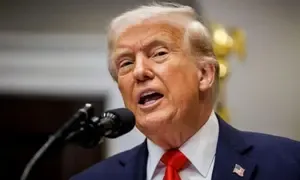Are South Korean Firms Facing Challenges Due to Trump's Trade Policy?

Synopsis
Key Takeaways
- Unpredictable trade policies create challenges for South Korean firms.
- Companies are considering relocating production to mitigate risks.
- Some sectors have been exempted from reciprocal tariffs.
- Strategic planning is hindered by uncertainty around U.S. policies.
- Ongoing trade negotiations could reshape future trade agreements.
Seoul, April 27 (NationPress) In his initial 100 days as President, Donald Trump has enacted numerous executive orders and tariffs aimed at diminishing the trade deficit of the United States while promoting domestic manufacturing. However, the swift and unpredictable nature of his policies has rendered South Korean corporations reluctant to commit to essential overseas projects and investments.
Trump's fluctuating policies, including country-specific reciprocal tariffs reaching as high as 50 percent and a 90-day pause on implementation, have created considerable uncertainty in global markets, as reported by the Yonhap news agency.
Many South Korean businesses, which depend heavily on exports to the U.S., are currently navigating the complexities of a more volatile trade landscape.
Starting his second term on January 20, Trump initially proposed a 25 percent tariff on all imports from Mexico and Canada, despite their tariff-free access to the U.S. under the U.S.-Mexico-Canada Agreement (USMCA), but later rescinded these duties.
In April, Trump introduced long-awaited reciprocal tariffs on products from countries that maintain trade surpluses with the U.S., alongside a 10 percent baseline duty on imports from all nations. South Korean goods faced a 25 percent reciprocal tariff.
While some sectors, including automobiles, semiconductors, and pharmaceuticals, were exempt from the reciprocal tariff, they still face existing or impending sectoral duties.
The inconsistency of trade policy from the world's largest economy has posed significant strategic challenges for numerous South Korean exporters.
To mitigate potential repercussions, various firms are exploring options to relocate production or scale back output.
However, experts caution that such measures have inherent limitations. The unpredictability surrounding forthcoming policy adjustments complicates long-term planning and increases costs.
"Companies will look for ways to cut costs by relocating manufacturing facilities or altering shipments to the U.S.," stated Cho Seong-dae, head of the trade policy research office at the Korea International Trade Association (KITA).
"Nevertheless, predicting U.S. trade policy is nearly impossible, leaving many decisions effectively in limbo. Everyone is awaiting Trump's next statement."
When the White House threatened tariffs on Mexican imports, South Korean companies with manufacturing bases in Mexico, such as Kia Corp., Samsung Electronics Co., and LG Electronics Inc., announced intentions to move their Mexican production to the U.S. or boost output in other locations.
Those plans were ultimately postponed after the tariffs on Mexico were lifted, and the country was excluded from reciprocal tariffs.
Hyundai Motor Group, South Korea's largest automobile manufacturer, recently revealed plans to invest US$21 billion in the U.S. over the next three years to enhance American production.
Despite this initiative, the company cannot entirely evade the sectoral tariffs imposed on imported vehicles.
Hyundai Motor Co. and Kia combined sold 1.7 million vehicles in the U.S. last year, with 1 million of those cars produced in Korea.
Meanwhile, Seoul and Washington initiated new trade discussions last week, with South Korea pursuing exemptions from both reciprocal and sector-specific tariffs. South Korea proposed a comprehensive "package deal" that addresses multiple sectors to secure more advantageous terms.
Amid these ongoing negotiations, many South Korean companies have adopted a cautious, wait-and-see approach, even as they devise contingency strategies.
Samsung Electronics, whose operations encompass semiconductors, home appliances, and smartphones, has expressed confidence in navigating the evolving trade landscape due to its extensive global production network.
"The effect of the new reciprocal tariffs is minimal, but we are closely monitoring the situation as U.S. trade policies continue to shift," remarked Yong Seok-woo, president and head of the visual display business at Samsung Electronics, during a press conference earlier this month. "With 10 production bases worldwide, we aim to tackle these challenges through strategic production allocation."
In the semiconductor sector, where Trump has suggested a new round of tariffs, South Korean chip manufacturers remain vigilant.
"We cannot do much at this stage," commented an official from a leading Korean chipmaker. "We must await Trump's next announcement before we can discuss our strategy."
Concerns are also mounting regarding investments already committed under the U.S. CHIPS Act.









